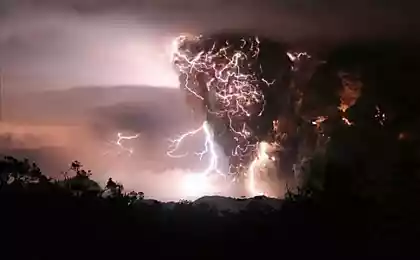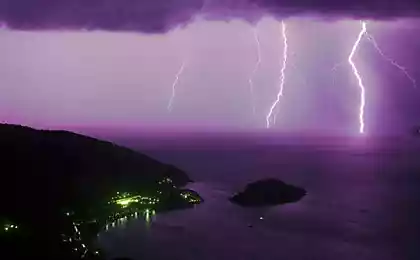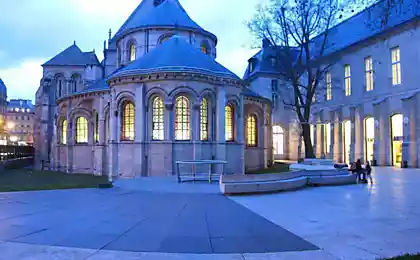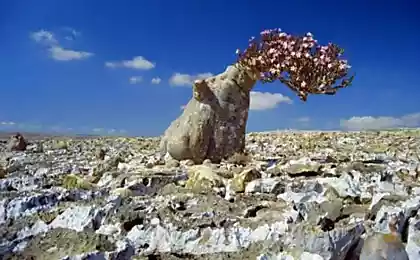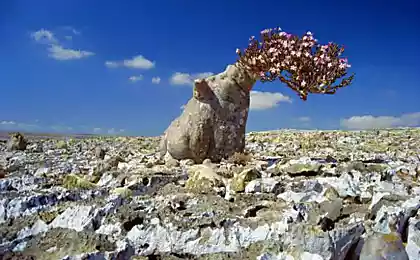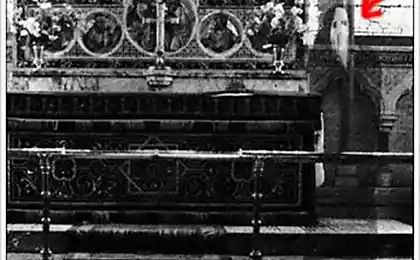1000
7 of the strangest natural phenomena
We need to develop your and our knowledge. Informative page on the Park ... Read, understand the world.
- While all of this - a natural phenomenon, chances are you've never seen them, even if they knew about them. This Venezuelan Catatumbo lightning, the fish rain in Honduras, goats grazing on the trees in Morocco, the red rain, the Brazilian Pororoka, Black Sun Denmark, fiery rainbow.
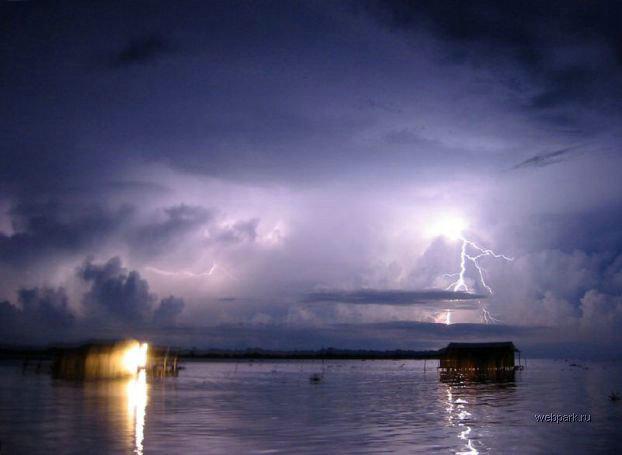
Catatumbo Lightning
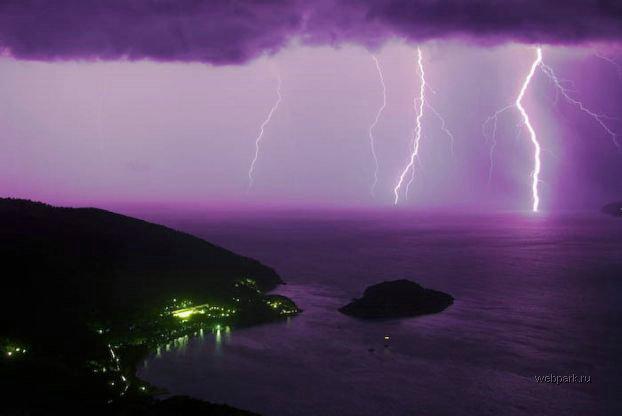
Lightning Catatumbo (Catatumbo) - a natural phenomenon, which constantly produces glow without any sound. Lightning occur at an altitude of about five kilometers. This happens 140-160 nights per year, at night for 10 hours a day, nearly 280 times per hour. It is almost a permanent phenomenon occurs in the mouth of the river Catatumbo, in the place where it flows into Lake Maracaibo - a large brackish lake in Venezuela.
Maracaibo - the largest lake in South America, its area is 13 210 km ?, it is also one of the oldest lakes in the world (according to some estimates - the second oldest). On the shores of the lake is home to nearly a quarter of the population of Venezuela. In the basin of Lake Maracaibo have large reserves of oil, so that the lake is a source of well-being of Venezuela. It is believed that the phenomenon of Catatumbo Lightning is one of the major ozone generators in the world. Approximately 1.176 million annually lightning visible at a distance of 400 km. Winds blowing from the mountains of the Andes, causing thunder and lightning in the atmosphere, these wetlands rich in methane, which is much lighter than air. Local environmentalists believe that this area of the country should be under the protection of UNESCO, since the lightning - a unique phenomenon and the biggest source of the recovery of the ozone layer of the planet.
Fish rain in Honduras
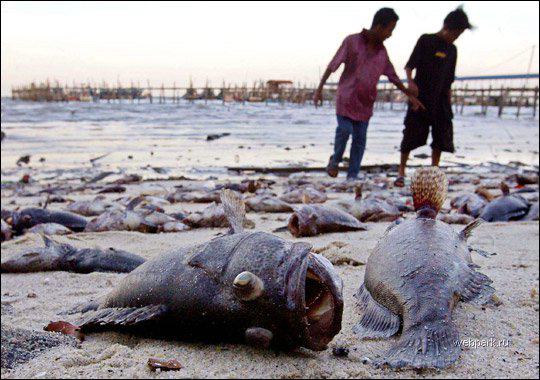
Rain of animals - a relatively rare meteorological phenomenon, although such cases have been documented cases in many countries throughout the history of mankind. But Honduran Folklore - this phenomenon regularly. Every year, between May and July in the sky there is a dark cloud, lightning, thunder, strong winds and 2-3 hours of heavy rain pours. Once he stops, the earth are hundreds of live fish.

People collect it, like mushrooms, and are home to roast. Since 1998, the festival is held here «Festival de la Lluvia de Peces» (Festival of the Fish Rain). He is celebrated in the city of Yoro, Department de Yoro, Honduras. One hypothesis of the occurrence of the phenomenon lies in the fact that the strong winds lifted into the air from the water the fish for several kilometers in height as the water of the Caribbean Sea from the north shore of Honduras abound in fish and other seafood. However, no one has ever witnessed, as it is exactly.
Morocco Goats grazing on trees
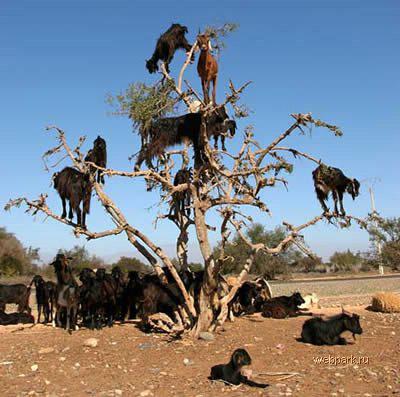
Morocco - the only country in the world where the goats due to lack of grass climb trees and graze where whole herds, regaling argan fruit, tree nuts which are made fragrant oil. This amazing picture can be seen only in the high and middle Atlas and the Souss valley and on the Atlantic coast between Essaouira and Agadir Sueyroy. In fact, goat herders graze, moving from tree to tree. When goats leave tree collected underneath nuts which are not digested by the stomach goats. However, such a global topically argan every year them, and accordingly, the oil from the nuts going less. Thus, this oil is believed to contain anti-aging microelements. But people do not want to use to rejuvenate the oil from the nuts, have been in the feces of goats. Therefore, now is the company to declare the locus of argan reserve.
Red rain of Kerala

From June 25 to 23 September over the territory of Kerala, India, periodically walked the red rain. Originally we thought that the color of the rain - this is the result of a hypothetical meteorite explosion.
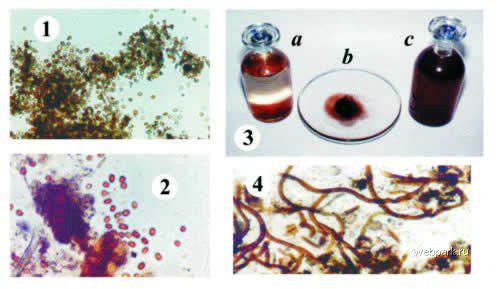
Later, when the story was repeated 4 March 2006, and managed to collect samples of rain water, scientists have concluded that it was painted «Rhodophyceae» - red seaweed, the inhabitants of the source Godfrey Louis to Kerala.
The longest wave in the world - in Brazil
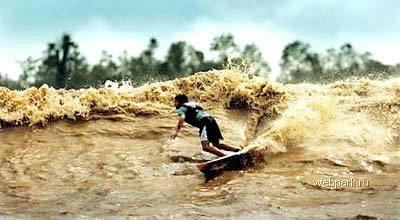
Twice a year - between February and March in Brazil, at the mouth of the Amazon oncoming rush of salt, heavier waters of the Atlantic Ocean meets its own over the river and pushes him violently laminating up river bed, resulting in a powerful counter-waves reaching a height up to six meters.
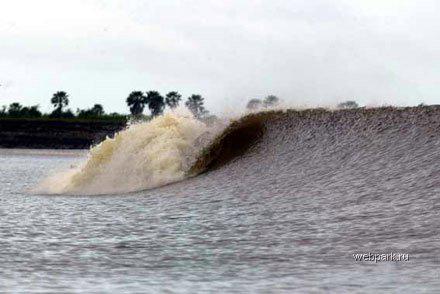
This phenomenon can last for half an hour, and is called - pororoka. Boiling wall of water rushing from a terrible crash at a speed of 25 km / h upstream, rising to 3000 km from the mouth. The water flooded and erodes the shore, and its noise is spread over several kilometers. At one of the local Indian dialects "amazuni" means "the rapid onslaught of water clouds." Probably, hence the name of the Amazon River.
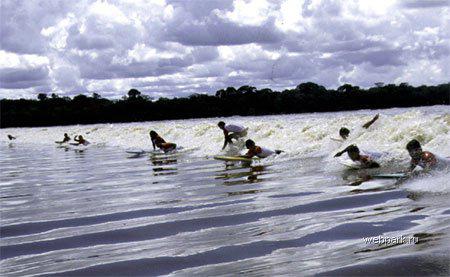
Such a wave - surfer's dream. Since 1999, San Domingo conduct of the competition, although such "heats" can be dangerous, because the water there are also pieces of coastal soil, and trees. Nevertheless, the record - 37 minutes pororoke (12, 5 km) has established the Brazilian Picuruta Salazar.
Black Sun Danish
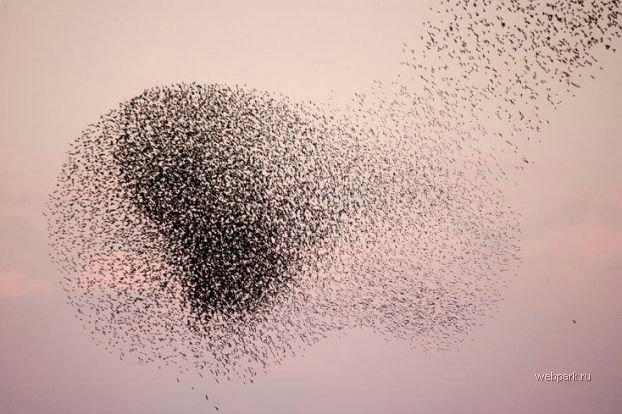
Spring in Denmark takes a surprising phenomenon: more than a million European starlings (sturnus vulgaris) flock from all neighborhoods in huge flocks of about an hour before sunset.
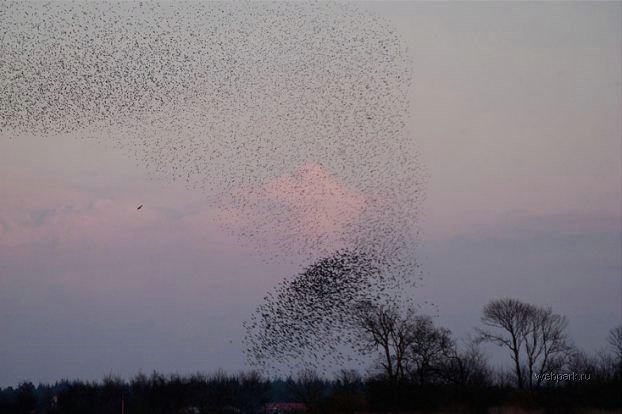
The Danes call it the Black Sun, you can watch him in the early spring throughout the swamps of western Denmark, from March to mid-April.
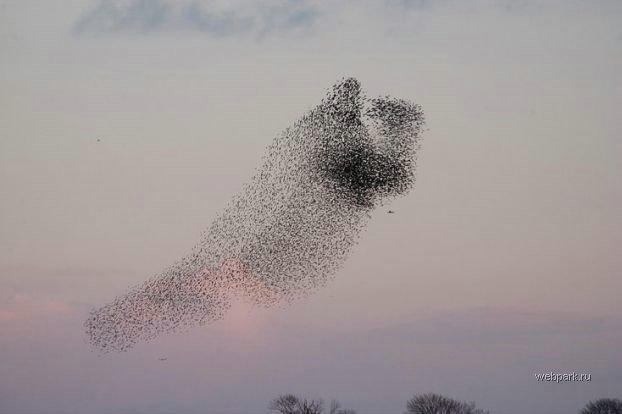
The starlings migrate from the south and spend the day in the meadows gathering food, and in the evening, after a curry collective pirouettes in the sky at night and arranged to rest in the reeds.
Fire Rainbow in Idaho
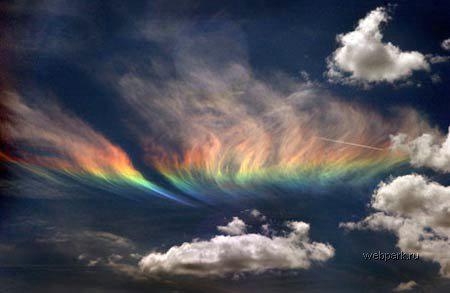
This rainbow - one of the rarest of atmospheric phenomena. Scientifically it is called "round-arch horizontal» (circumhorizontal arc). It is formed due to the passage of light through light, high cirrus clouds are located, and occurs only when the sun is very high in nebe- at a height of 20,000 feet, and changes more than 58 degrees above the horizon. In addition, the hexagonal ice crystals that make up cirrus clouds must be in the form of plate and their faces be parallel to the ground. Light enters the vertical face of the crystal and is on the lower side is refracted in the same way as when the light passes through the prism.
-
- While all of this - a natural phenomenon, chances are you've never seen them, even if they knew about them. This Venezuelan Catatumbo lightning, the fish rain in Honduras, goats grazing on the trees in Morocco, the red rain, the Brazilian Pororoka, Black Sun Denmark, fiery rainbow.

Catatumbo Lightning

Lightning Catatumbo (Catatumbo) - a natural phenomenon, which constantly produces glow without any sound. Lightning occur at an altitude of about five kilometers. This happens 140-160 nights per year, at night for 10 hours a day, nearly 280 times per hour. It is almost a permanent phenomenon occurs in the mouth of the river Catatumbo, in the place where it flows into Lake Maracaibo - a large brackish lake in Venezuela.
Maracaibo - the largest lake in South America, its area is 13 210 km ?, it is also one of the oldest lakes in the world (according to some estimates - the second oldest). On the shores of the lake is home to nearly a quarter of the population of Venezuela. In the basin of Lake Maracaibo have large reserves of oil, so that the lake is a source of well-being of Venezuela. It is believed that the phenomenon of Catatumbo Lightning is one of the major ozone generators in the world. Approximately 1.176 million annually lightning visible at a distance of 400 km. Winds blowing from the mountains of the Andes, causing thunder and lightning in the atmosphere, these wetlands rich in methane, which is much lighter than air. Local environmentalists believe that this area of the country should be under the protection of UNESCO, since the lightning - a unique phenomenon and the biggest source of the recovery of the ozone layer of the planet.
Fish rain in Honduras

Rain of animals - a relatively rare meteorological phenomenon, although such cases have been documented cases in many countries throughout the history of mankind. But Honduran Folklore - this phenomenon regularly. Every year, between May and July in the sky there is a dark cloud, lightning, thunder, strong winds and 2-3 hours of heavy rain pours. Once he stops, the earth are hundreds of live fish.

People collect it, like mushrooms, and are home to roast. Since 1998, the festival is held here «Festival de la Lluvia de Peces» (Festival of the Fish Rain). He is celebrated in the city of Yoro, Department de Yoro, Honduras. One hypothesis of the occurrence of the phenomenon lies in the fact that the strong winds lifted into the air from the water the fish for several kilometers in height as the water of the Caribbean Sea from the north shore of Honduras abound in fish and other seafood. However, no one has ever witnessed, as it is exactly.
Morocco Goats grazing on trees

Morocco - the only country in the world where the goats due to lack of grass climb trees and graze where whole herds, regaling argan fruit, tree nuts which are made fragrant oil. This amazing picture can be seen only in the high and middle Atlas and the Souss valley and on the Atlantic coast between Essaouira and Agadir Sueyroy. In fact, goat herders graze, moving from tree to tree. When goats leave tree collected underneath nuts which are not digested by the stomach goats. However, such a global topically argan every year them, and accordingly, the oil from the nuts going less. Thus, this oil is believed to contain anti-aging microelements. But people do not want to use to rejuvenate the oil from the nuts, have been in the feces of goats. Therefore, now is the company to declare the locus of argan reserve.
Red rain of Kerala

From June 25 to 23 September over the territory of Kerala, India, periodically walked the red rain. Originally we thought that the color of the rain - this is the result of a hypothetical meteorite explosion.

Later, when the story was repeated 4 March 2006, and managed to collect samples of rain water, scientists have concluded that it was painted «Rhodophyceae» - red seaweed, the inhabitants of the source Godfrey Louis to Kerala.
The longest wave in the world - in Brazil

Twice a year - between February and March in Brazil, at the mouth of the Amazon oncoming rush of salt, heavier waters of the Atlantic Ocean meets its own over the river and pushes him violently laminating up river bed, resulting in a powerful counter-waves reaching a height up to six meters.

This phenomenon can last for half an hour, and is called - pororoka. Boiling wall of water rushing from a terrible crash at a speed of 25 km / h upstream, rising to 3000 km from the mouth. The water flooded and erodes the shore, and its noise is spread over several kilometers. At one of the local Indian dialects "amazuni" means "the rapid onslaught of water clouds." Probably, hence the name of the Amazon River.

Such a wave - surfer's dream. Since 1999, San Domingo conduct of the competition, although such "heats" can be dangerous, because the water there are also pieces of coastal soil, and trees. Nevertheless, the record - 37 minutes pororoke (12, 5 km) has established the Brazilian Picuruta Salazar.
Black Sun Danish

Spring in Denmark takes a surprising phenomenon: more than a million European starlings (sturnus vulgaris) flock from all neighborhoods in huge flocks of about an hour before sunset.

The Danes call it the Black Sun, you can watch him in the early spring throughout the swamps of western Denmark, from March to mid-April.

The starlings migrate from the south and spend the day in the meadows gathering food, and in the evening, after a curry collective pirouettes in the sky at night and arranged to rest in the reeds.
Fire Rainbow in Idaho

This rainbow - one of the rarest of atmospheric phenomena. Scientifically it is called "round-arch horizontal» (circumhorizontal arc). It is formed due to the passage of light through light, high cirrus clouds are located, and occurs only when the sun is very high in nebe- at a height of 20,000 feet, and changes more than 58 degrees above the horizon. In addition, the hexagonal ice crystals that make up cirrus clouds must be in the form of plate and their faces be parallel to the ground. Light enters the vertical face of the crystal and is on the lower side is refracted in the same way as when the light passes through the prism.
-
